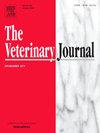Association of prepartum clostridial vaccine administration with mitigation of respiratory and gastrointestinal disorders in calves
IF 3.1
2区 农林科学
Q1 VETERINARY SCIENCES
引用次数: 0
Abstract
Pathogenic clostridial infections, particularly those involving Clostridium perfringens type A (CpA)-derived alpha-toxin (CpA-α), are a recognized cause of gastrointestinal disorders in young ruminants. However, the potential role of anti-clostridial antibodies in mitigating not only gastrointestinal but also respiratory disorders in calves remains poorly investigated under field conditions. This study evaluated the effects of anti-clostridial antibodies passively transferred from cows vaccinated with a clostridial vaccine (CV) during the prepartum period on gastrointestinal and respiratory disorders in nursing calves. Cows in the CV group were vaccinated at 8 and 4 weeks before parturition, whereas control cows were not. Colostrum intake was verified in calves from both groups. Serum antibody titers against clostridial and bovine respiratory disease (BRD) pathogens were measured. Treatment frequency and fecal consistency were also recorded. Anti-clostridial antibody titers were higher in CV cows and their calves compared to the control group. In the CV group, the number of respiratory treatments in calves showed a decreasing trend from 5 to 8 weeks of age and was significantly lower from 9 to 12 weeks of age. Fecal consistency at 1 week of age was also significantly improved in the CV group. The number of respiratory treatments was negatively correlated with anti-CpA-α antibody titers in calves, but not with anti-BRD titers. These findings suggest that prepartum CV vaccination may help mitigate both respiratory and gastrointestinal disorders in nursing calves, potentially reducing antibiotic use and lowering the risk of antimicrobial resistance in livestock industry.
预备梭状芽孢杆菌疫苗接种与犊牛呼吸和胃肠疾病缓解的关系
致病性梭菌感染,特别是与A型产气荚膜梭菌(CpA)衍生α毒素(CpA-α)有关的梭菌感染,是幼龄反刍动物胃肠道疾病的公认原因。然而,在野外条件下,抗梭菌抗体在减轻犊牛胃肠道和呼吸系统疾病方面的潜在作用仍未得到充分研究。本研究评价了在准备期接种梭状芽胞杆菌疫苗(CV)的奶牛被动转移抗梭状芽胞杆菌抗体对哺乳小牛胃肠和呼吸系统疾病的影响。CV组奶牛在出生前8周和4周接种疫苗,对照组奶牛不接种疫苗。验证了两组犊牛的初乳摄入量。测定血清抗梭菌和牛呼吸道疾病(BRD)病原体抗体滴度。同时记录治疗频率和粪便浓度。与对照组相比,CV奶牛及其犊牛的抗梭菌抗体滴度较高。CV组犊牛呼吸治疗次数在5 ~ 8周龄呈下降趋势,在9 ~ 12周龄显著降低。CV组1周龄时的粪便稠度也有显著改善。呼吸治疗次数与犊牛抗cpa -α抗体滴度呈负相关,与抗brd滴度无显著相关性。这些发现表明,准备接种CV疫苗可能有助于减轻哺乳小牛的呼吸和胃肠道疾病,潜在地减少抗生素的使用并降低畜牧业中抗菌素耐药性的风险。
本文章由计算机程序翻译,如有差异,请以英文原文为准。
求助全文
约1分钟内获得全文
求助全文
来源期刊

Veterinary journal
农林科学-兽医学
CiteScore
4.10
自引率
4.50%
发文量
79
审稿时长
40 days
期刊介绍:
The Veterinary Journal (established 1875) publishes worldwide contributions on all aspects of veterinary science and its related subjects. It provides regular book reviews and a short communications section. The journal regularly commissions topical reviews and commentaries on features of major importance. Research areas include infectious diseases, applied biochemistry, parasitology, endocrinology, microbiology, immunology, pathology, pharmacology, physiology, molecular biology, immunogenetics, surgery, ophthalmology, dermatology and oncology.
 求助内容:
求助内容: 应助结果提醒方式:
应助结果提醒方式:


